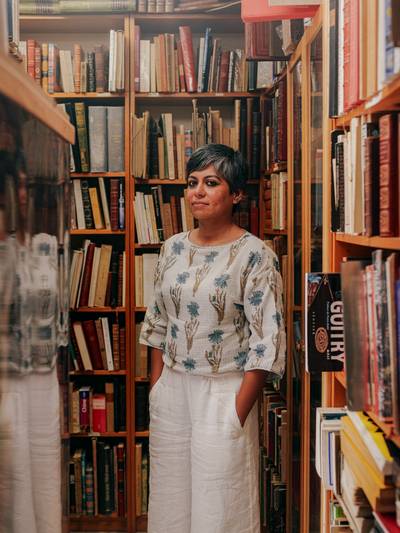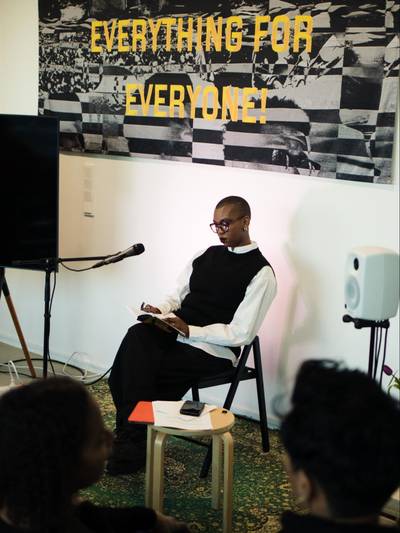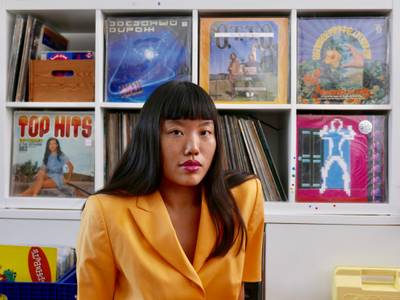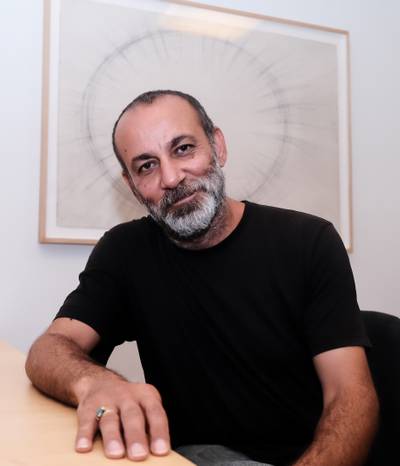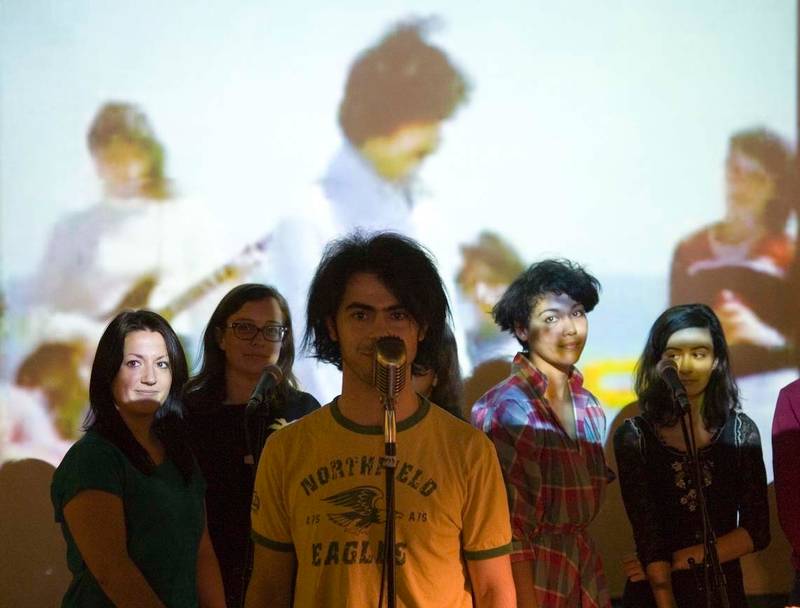

Hiwa K, Chicago Boys, 2011, courtesy of the artist and KOW Berlin
Ali Akbar Mehta (b. 1983, IN/FI) is a Transmedia artist, curator, researcher and writer. Through a research-based practice, he creates immersive cyber archives that map narratives of history, memory, and identity through a multifocal lens of violence, conflict, and trauma.
Hiwa K. was in Helsinki in September for the press announcement of his invitation and acceptance of a new commission by IHME: to organise and conduct his famous participatory work Chicago Boys: While we were singing, they were dreaming during April-May 2023, in Helsinki.
Hiwa is interested in research, participatory working, and collective action, but he is also interested in making it, for lack of a better word, fun. Previously written texts and press articles on Hiwa have called him an “extellectual”, someone who gains knowledge from ‘the streets’, through conversations and the exchange of books. Despite the risk of repeating pre-published information, I find it critically important for the sake of reading the following interview to point out that the qualities of humour and satire—to neither take oneself too seriously nor wallow in the miseries of the world—occupy a central position in Hiwa’s work.
ALI: The multiple ecological crises that the world faces today are often central themes in your work. Can we open this conversation by addressing this urgency?
HIWA: I wouldn’t call the ecological crises ‘urgency’ or ‘emergency’; I might say it is already too late. We cannot stop the glaciers from melting, can we? Even though we are acting upon it now, we’re late. But for some countries, it is more urgent to bring certain practices: How to deal with the water shortage? I am constantly thinking about how not to waste water when watering plants and trees, especially on my farm.
The Americanization of Iraq and the introduction of American farming processes in 2003 brought many chemical pesticides to Iraq. Also, so many new developments – for example, Monsanto’s agreement with the country – are depriving people of their own culture and tools, which they have used for thousands of years. Did you know that archaeologists have discovered Iraq to be the oldest agricultural site? The first thing that the American rockets hit [during the Iraq War, from 2003-2011] was the bank of seeds, which contained seeds as old as 5000-6000 years. And that is a fight against your memory, a battle to erase memory, because the fascist system, embodied in the neoliberal machinery now, doesn’t need the past. It doesn’t even need the present – it just needs you to be there for the sake of the future.
I come from a Marxist atheist background, but lately, this defeat opened up a spiritual space in me, spiritual in the sense of reconnecting to the ‘source’ – it could be a tree or nature. I started developing a praxis of embodied research dance and tried to do this with people so they get closer to their guts and inner space and create a community. Right now, we are practising ‘fasting’, trying Buddhist and Islamic practises to endure pain or, at the very least, to consume less.
You moved back to Sulaymaniyah three years ago in Iraqi Kurdistan, your homeland, after living in Germany for twenty years. And there, now, you are living on a farm and engaging with permaculture. Is there a relationship between home, by extension, homeland, and the kind of critical repair work that you’re currently engaged with?
Each time I went to Sulaymaniyah, I said, “I came back”; when I went to Berlin, I said, “I came back”. I’ve spent exactly half of my life in two places, two homes with very different contexts. So I try to see what could work from everywhere. But for me now, it was urgent to go to places more affected by the ecological crisis.
As a kid or even 20 years ago, I don’t remember the temperature in my home town ever going above 50º Celsius. Now, it goes above 60º, which is alarming. Sulaymaniyah is at a high altitude and surrounded by mountains; historically, it has had an abundance of water. Now we have an acute water shortage, where the water level is moving quickly from orange to red zone. This summer was a bit better, but it was heartbreaking to see all the trees dry in the summer before. Usually, we’d hear large numbers of birds during the mornings at my farm. But last summer, we heard almost nothing because there was no water for them. Of course, these changes result from man-made ecological crises, especially in the area where Turkey and Iran have been building several dams.
Building such dams has drowned significant archaeological sites in Iraq – sites that have importance and relevance to the people living there for centuries, several of whom are minorities of different religious backgrounds, such as Shiites, Sufi Shiites, Dersim and Kurdish minorities. At the same time, the rivers are drying out, causing droughts in Iraq. Building dams permit these countries to control internal and regional conflicts and gives them the power to suppress countries dependent on these rivers, like Iraq and Syria, to name a few.
At the same time, I was somewhat disappointed with the art world, which is becoming more market-oriented, self-referential, and over-competitive every day. I didn’t want to get lost in that machinery. First, you must be successful and then maintain that success and its appearance. This was negatively affecting me. As soon as the market opened up, I thought getting lost in this machinery might not be the right move for me. I still sell works but sell as much as I need to finance my projects.
At the same time, I was somewhat disappointed with the art world, which is becoming more market-oriented, self-referential, and over-competitive every day. I didn’t want to get lost in that machinery. First, you must be successful and then maintain that success and its appearance. This was negatively affecting me. As soon as the market opened up, I thought getting lost in this machinery might not be the right move for me.
Could we go back to a word you used, ‘defeat’; what is this defeat you are referring to?
Defeat is the helplessness we are facing. In earlier times, you couldn’t hold demonstrations in a dictatorial regime. Today we have a finer dictatorship where although you can hold demonstrations, they should be registered. Regimes, in fact, benefit from the act [of protest]. The ‘Neoliberal Economy’ pretends to be a democratic system, and neoliberalism has been tried in Iraq. As Naomi Klien calls it, the whole project in Iraq was the “neoliberal project” – to bring neoliberalism to the country. And it works perfectly in Kurdistan, northern Iraq, where I come from.
In Sulaymaniyah, you have a number of gated communities for rich people, and this division is increasing. The defeat of the poor against the rich, the gap between rich and poor, is getting more and more in Iraq. The defeat of consciousness, as it were. People listen to the media as if whatever it says becomes the ‘truth’. We must acknowledge that there is a sense of defeat worldwide instead of giving ourselves a false feeling of hope. To reach that hope, we have to first acknowledge our collective condition. Also, the defeat of art – I felt this defeat in my work and in how I was operating. I felt helplessness in my work and saw it in my surroundings. That is what I call defeat.
You have said that we are at a point where the land needs to be returned to its state of balance, and it may be that the needs of ecology and human beings are in direct conflict. This conflict places humans and nonhumans in an adversarial relationship. How can artists negotiate this conflict?
Art is a small platform that only elites are listening to. Not so many people know what artists are saying. So as artists, we need to build organic spaces where people can come and where you don’t have masters and disciples, only participants. Where we could go back to a certain set of core values, you know, Marx also talked about this, ‘you have to produce where you are’, and ‘take people out from that alienation of production’. An example of this today is the state of the global market economy, where supermarkets are fighting against local productions, and local farmers are defeating traditional markets, commodifying organic foods which have been there for thousands of years.
As an artist, it doesn’t mean that I have to completely give up my practice – I do my work, too. But there is something more that we have to share with others, try to bring awareness. In working with farming practices in Sulaymaniah, I learned that in the past, they used nature-friendly and ecologically-friendly materials to cure their trees and soil instead of harmful chemical pesticides. This led to the realisation that there were human beings who were ecological and that the word ‘ecology’ is simply an addition to what already existed. Even during the First and Second World Wars, people were dying, but they were still ecological bodies that were dying, not harming the soil. Now everybody who dies harms the soil because we have too many chemicals in our bodies.
West is part of the ecological damage and is benefiting from its economic model, but it could be advantageous to reconnect with the West because they have tools, money and interest. We can try to make this connection with activists and institutions here to build things together.
Art is a small platform that only elites are listening to. Not so many people know what artists are saying. So as artists, we need to build organic spaces where people can come and where you don’t have masters and disciples, only participants. Where we could go back to a certain set of core values, you know, Marx also talked about this, ‘you have to produce where you are’, and ‘take people out from that alienation of production’.
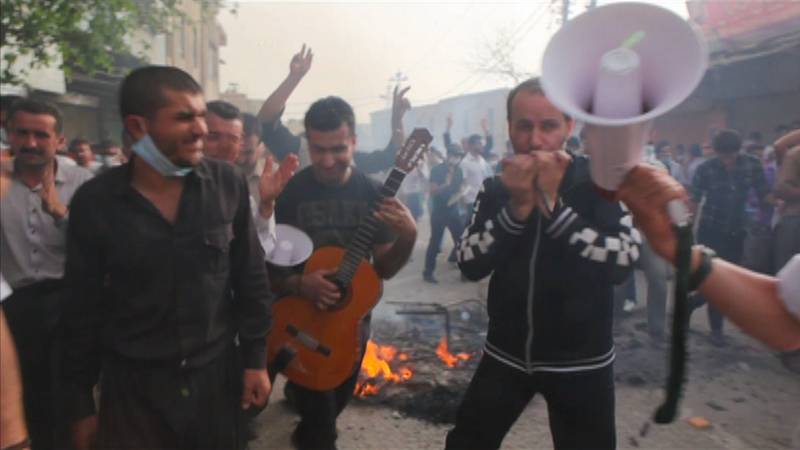

Hiwa K, This Lemon Tastes of Apple, 2011, video still, courtesy of the artist and KOW Berlin.
We know that the ecological crisis has a long timeline, and historically, a certain hierarchy or vertical identity of coloniality is at play in the making of this crisis. When we think about the Global South in relation to the ecological crisis, those communities who’ve traditionally been closer to nature, or at least have been in a balanced, sustainable relationship with nature – this crisis is not of their own making. It is often the more vulnerable, the more stigmatised, the more marginalised communities – that bear the brunt of any ecological or political crisis. How can we shift this popular narrative, one that tends to claim that if a place is suffering or is affected by this ecological crisis, then the people living there must have caused it in some way or be responsible for it?
Do you mean shifting the narrative of being stigmatised – that we are causing this by ourselves? It is regrettable if people thought like this. I would say then that such people are not aware of what is happening in the world is often caused by their (own) governments.
It took me a long time to adapt or become comfortable in another country. So to me, “Go home” is childish nagging. Yes, we want to go home too. I don’t think many people want to leave their country, but you have to. As activists have to, you know, collectively, also put pressure on governments not to leech onto our countries and not export their wars to our countries. For example, the dams I was talking about earlier, many German companies were involved in building those dams in Turkey. Finland is training the Kurdish police, the same police acting as militias and shooting the demonstrators, as seen in my video, This Lemon Tastes of Apple (2011)1. Iraq got chemical weapons from Germany and some other countries. While doing The Bell Project (2015)2 and working with Nazhad, the guy who melts the weapons, I found out that there are over 40 countries that are selling weapons to Iraq and Iran. Some were even selling these weapons to both countries at the same time, with the same ship. These countries are powerful, and these deals and events happen quickly. When we go back to our countries as Europeans, we know that Europe is involved in this dirty business. It’s not about blaming. It’s about stating facts.
So I feel these things are common knowledge, and only those people who don’t know stigmatise them. This bias comes from direct, local experiences, where people are harmed by the brutal [neoliberal] market conditions, and migrants are seen as a way to get cheaper labour. And so they go, and they vote for the right wing instead of understanding where the core problem is. And that’s what art should be here to understand and do. As artists and activists, we need to highlight these issues and make them clearer to people.
For this, we need to have a better voice, a higher voice, maybe even through TV stations. As artists, we don’t have a TV station; we just have a small space, which I think can be very pathetic compared to the space and outreach controlled by TV channels, where everyone is listening to them, seeing it as an ‘ultimate truth’.
When you talk about artists having the means of communication that can equal communication generated by TV channels, one must also be cognizant of how communication infrastructures are now being controlled – how its production economies and politics are increasingly focused to generate right-wing content and propaganda, rather than platforming Leftist, Marxist, or even artistic voices. Why do artists shy away from thinking about infrastructures, about their roles in ways their praxis can have the capacity to affect these larger infrastructures? Could you also talk about what collective working is?
An artist is ambitious to make interesting and good works. Still, I feel there is an ethical responsibility to do something in larger, more collaborative contexts with everyone. Often, we oversaturate exhibition goers not just with works but also with the expectation that they have to understand them immediately.
Maybe it’s just that we are doing something, you know, especially as a way to counter these colonial and neo-liberal agendas. Recently, I was in Nida, Lithuania, where this land is in danger of being privatised by those rich people who want to want to buy it. And it’s interesting, for me, that institutions are doing the Chicago Boys there and, you know, trying to restore things which had been damaged. And yes, this also gives me hope to do it in Helsinki, in Sulaymaniyah, and in different places of the world.
Making art easy and accessible is a big challenge. Art should talk to people and draw people to themselves instead of only residing in museums where, you know, the focus becomes on a few select visitors, footfall and traffic statistics. It’s crucial to start with those projects. It gives me hope when I see all the places where they do the Chicago Boys project, sometimes without even telling me, you know, they just continue. I say, be free, even change the name or never mention me. I’m happy that it continues.
I can perhaps elaborate that the Chicago Boys Nida iteration commissioned by the Nida Art Colony (NAC) began in 2020 and continued until 2022, and what Hiwa is referring to is the second phase, where a ‘study group’ formed by Lithuania-based activists from G1PS Labour Union, Kaunas Zoo Musical Collective, Emma Social Centre, Luna6 Movement Space, and GPB News Portal worked to question the neoliberal structures over the past 30 years as an intrinsic part of daily life in Lithuania. They established a rough timeline of indentations, discussing their consequences and associating songs with these moments. Besides the closing concert, the results of this process will materialise as a bibliography and a collection of books and reading/viewing/listening material as part of the NAC library.
Several concerns that Chicago Boys is engaging with, of neo-liberal economies, coloniality and ecology, are rooted in your experiences before and during your time at the Mainz Academy of Art. In relation to this, you previously have spoken about the feeling of being afflicted with something, the symptoms you were unable to articulate until you realized that what you were suffering from was cultural domination - a feeling that people go through without realizing. It is possible to feel this ‘unknown feeling’ even without leaving your home, homeland or country. Could you talk about your time at the Academy and how you coped with this unnamed affliction?
Let’s take language as an example. When you speak a language, the language also speaks through you. When learning a language, one assumes that what one is learning is to speak. But no, you are only learning the rules. From the time you start hearing and picking up words, you are implicated in their institutionality. It is the first institution which brutally disciplines you, then comes the institution of ‘family’, then ‘school’, and then you have other institutions. In the same way, as an artist, when you pick up your colour and a canvas, you know, you have picked up a tool that is already institutionalized, that has already been determined by another part of the world. By the time you’re five years old, you know all the rules, you know exactly how to play in that theatre. You are manipulated completely. It may provide you with alphabets for making art, but you are swimming in an ocean of illusion. It often takes many years for artists – not only for the dominant people but also for the dominant people – to find the shore, to find their way.
As a painter, I had been struggling and coping with Eurocentrism for fourteen years. To me, it was clear that western art education needed to go through changes. So, when I applied to the Mainz Academy of Arts, I was clear that I was not going there to make art. I was going there not to make art and to question things. My questions about western art institutions led me to it – especially as someone who comes from my background and from my geopolitical background, my cultural background, of belonging to a people who went through centuries of brutal brainwashing and changes. I went to decolonise my path, my brain, my eyes, everything.
There is a moment where ‘Narcissus’ says the word narcissus to ‘Echo’. He expects that Echo will say back the word narcissus, but Echo translates this word and transforms it into the word echo instead of narcissus. So here is the moment I like, and Jacques Derrida talks about it in a way that is beautiful – it is the moment that Echo begins to stand up for herself against this dominance of Narcissus, who is this self-referential ‘image’, and she is a ‘sound’, she reflects her own name. I see the story of ‘Echo’ and ‘Narcissus’ as a concept central to my practice and geopolitical context. I never speak as Hiwa, but I speak as my collective self, you know, of where I come from. I don’t see this collective as divided, I see that we have fingerprints upon each other all the time. And we’ve been doing this for centuries, for thousands of years. This is what colonialism tries to deny.
And that’s why I wasn’t afraid to make anything – to suddenly connect with my mother on messenger, or to teach this US American soldier how to play country guitar, to start cooking sessions and cooking demonstrations in the institution3. This became more meaningful for me and replaced the canvas because as soon as you make a crack in the illusion, you don’t want to copy it anymore. I felt that I had started to speak a language which was completely new but, more honestly, closer to myself. Of course, it’s also very risky because you’re the only one speaking that language. While I was doing my white wall and everyone else was painting and making sculptures, they [fellow students and faculty] asked, “are you not afraid to lose time?” or “ are you not afraid to not make it in the art world?” or “How do you want to live after if you want to work like this?” So it’s a risk when you want to be yourself or when you want to bring something a bit closer to your own culture.
Earlier, you spoke about visiting both Sulemaniyah and Berlin as a ‘going back’, implying a dual sense of home, of embodying multiple identities and contexts, and also about identity as a ‘collective self. How do you contain the distinct identities and present them as a cohesive identity?
My hometown, Sulaymaniyah, is a Kurdish city. We lived in an Arab neighbourhood, and after two years of speaking Arabic every day with friends, I started switching to Arabic as my primary language. One day at home, I was maybe eight years old and was about to talk to my sister in Arabic. At that moment, I remember thinking, “if you now talk in Arabic, you will continue in Arabic.” I switched to Kurdish and didn’t switch back to Arabic. I am used to this kind of struggle, you know, to claim your own voice, not in a nationalistic way, representative or exotic way that ‘I am Kurdish and so I must speak this language. Being able to say that I’m used to this kind of struggle also comes from living under another identity for 15 years, hiding where I come from, which nationality I have, and which languages I speak. For many years until recently, I had adapted to a new name. And then, when I suddenly got my real name back officially through extended court processes, I started missing my fake identity: Who was the fake actually? Okay, they both were fake, you know, but they are both real also.
I believe language is speaking through you, you don’t speak the language – which is true even if it is your mother tongue. And this is what I am interested in: how to crack that illusion of voices and vowels. That’s why for Chicago Boys, we invite people to sing a song they don’t understand. Elena is British, and she sings a Farsi song. In order to do this, she has to adapt the interior architecture of her tongue, mouth, jaws, everything to a different opening, a different closing, you know, that alters the way you shape your vowels and form your words. Even when you speak another language, you have a dialect because you force your architecture to include something else which doesn’t fit into that space. Or we invite people who are professional guitarists to play the drums, to play another instrument, to put people in that zone to understand other possibilities. This kind of stretch into a moment of discomfort is exciting for me.
As a painter, I had been struggling and coping with Eurocentrism for fourteen years. To me, it was clear that western art education needed to go through changes. So, when I applied to the Mainz Academy of Arts, I was clear that I was not going there to make art. I was going there not to make art and to question things.
Relationships with language, and by extension, the social contracts and institutions that intertwine identity, are complex issues to navigate. Such a relationship informs a specific kind of identity and belonging. Could you share your experiences of navigating these issues?
I’ve been familiar with this distinction because I come from an Iraqi Kurdish family. In Iraq, Iraqi Kurdish is a minority language, the majority is Arabic. My mother forced my admission into an Arabic (speaking) school. I didn’t know the language during the first year, so I’d mimic other children. Only later did I realize that what I had learnt was a ‘language’. Until then, it was only ‘sounds’. When I grasped that what I was learning is a language, it opened a new world. I love the Arabic language, and I have studied it formally. German was the sixth and last language I learnt. After this, I got tired and decided not to learn any more languages [laughs].
It’s a good idea to find out the gaps in languages you learn, and you can re-introduce these gaps back to the language. And so, in my work, I need jokes and humour. Because for me, a joke is a ‘crooked way’ to give you a straight message. In the end, the dynamic of the joke is intended to disintegrate you from what you are used to. With these kinds of jokes and my practice, I built a lexicon of humour for dealing with complex materials and subjects. Also, for me, telling these jokes and stories, making presentations or showing my works in Germany or Europe or in the whole world is a way to make a crack into this ‘solid-ness’ of a dominant identity, this solidity of what they think as an identity is.
Since documenta 14, you made a decision to work against the demands of hyper-production, to not get embroiled in the machinery of the art market. Your proposal of unworking is a philosophical or ideological stance. What was your journey to this realization?
That which is considered to be Contemporary Art, and the criteria that shape it, are determined by the West, and all that we [as residents of the global south] are trying, you know, in German, we say auseinandersetzen – ‘to deal with it’. I feel that our task is not doing art but highlighting questions, facilitating a transformation, helping it gain momentum, and showing what it can do. For artists, subverting and redirecting a system is a great way of influencing policy. A great strategy of artists is to disturb the system.
There is immense pressure in art academies and institutions for students to be more employable or artists to be more sellable. When I tell students, “no, if you have ten good works in your entire life, it’s more than enough”, they feel relaxed hearing this because otherwise, they are forced to work all the time to make twenty to fifty works a year. Because that is a neoliberal way of living, you know, like pushing a tree to grow very fast. When we go into nature, we see how slow growth is. And that helps also in dealing with the ways in which we can work.
After my participation in the Venice Biennale (2015) and documenta 14 (2017), I experienced a kind of tsunami of every institution suddenly becoming interested in working with me. But my capacity as an artist, as an individual, remained limited. My galleries were not happy because I didn’t produce many works. I’m slow in my practice and rarely have [ready] works. I don’t have a large body of work either. I have probably made two works in the last seven years. I often copy-paste and experiment with materials in different combinations and iterations. That is why I sell my work in editions so that I can maintain myself and my living conditions instead of forcing myself to have a new idea every day. I still need to sell because you must be able to do your projects and maintain your own projects to help people in your surroundings, artistically and otherwise.
The way you deal with your art practice also tells us about the content of what you are saying and making. I mean, you cannot be post-colonial and also be dominating the materials. Many works are being made against capitalism or that are talking about the ecological crisis. All good, but where is the practice where we could just gather? During the Bergen assembly, I tried to sit with the curatorial team for twelve minutes to watch one of my silent videos, say nothing and do nothing, and they got really stressed.
I also think that governments should spend more money on artists to further develop the cultural scene. We need practices and projects which are impossible without large-scale and continuous support because a self-sustaining art economy is an illusion. The systems of art economy are based on disturbing your inner peace, making you feel a sense of inferiority. Then you have to push yourself till you ‘make it’, and when you make it, it’s either empty, or you uphold the system and maintain this illusion. You just have to make a U-turn, you know. You need time and space to reflect, to do nothing, to digest what is happening around you and in the world. The capitalistic system always tries to make you a ‘star’, and I say, no, I’m fine being a ‘half-moon’.
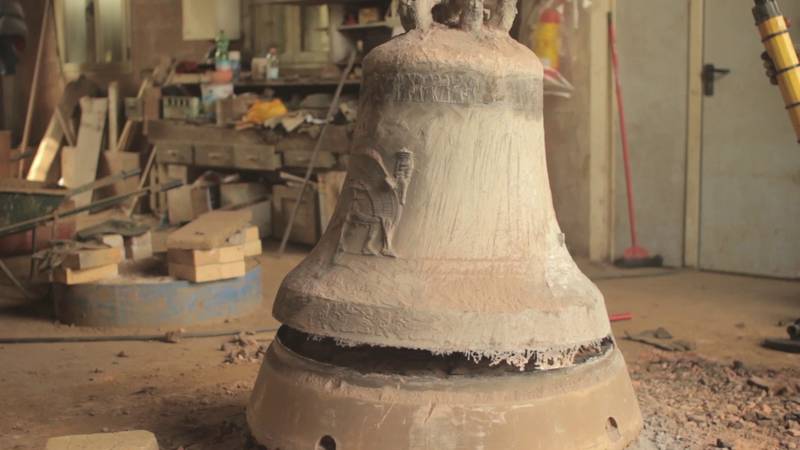

Hiwa K, The Bell, 2007 - 2015, video still, courtesy of the artist and KOW Berlin
